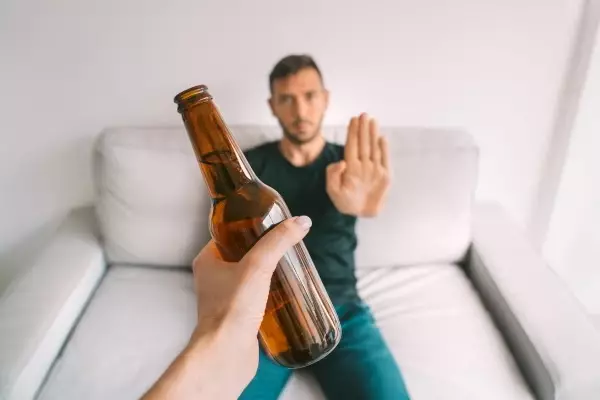Sober living can be a great way to get and stay sober. It can provide structure and support during early recovery when sobriety is new and fragile. This can also be a great step towards independence for people who have been in treatment. Sober living can be a safe and sober environment for people to live in while they work on their recovery.
When we say sober living, it's not just substance abuse treatment or seeking help from the mental health services administration. It's more than just that. It is a lifestyle. It is a way of life that one chooses to live in order to maintain sobriety. While the support of family members, friends, and other loved ones is important, it is not always possible to be around them constantly. That's where sober living comes in. It can provide the support and structure needed to stay on track with your sobriety goals.
If you're interested in learning more about it and living a sober life, this guide is for you. We'll cover everything from what sober living is to how to find a program that's right for you. Sober living can be a life-saving choice for many people, and we hope this guide helps you make the most of it.

Understanding Sober Living and Alcohol Addiction
First, let's start with understanding what sober living is. Sober living is a type of housing arrangement that helps people in early recovery from substance abuse disorders or addiction. It usually takes the form of an apartment complex or group home where residents must stay sober and follow certain rules.
According to the National Institute on Alcohol Abuse and Alcoholism (NIAAA), sober living is "a drug-free environment that promotes continued recovery from alcoholism and other drug dependence." In other words, it's a place where you can live without drinking alcohol or using drugs.
There are many different types of sober living environments, but they all have one common goal: to help you stay sober. A sober house is typically run by treatment centers, while others are independent. A sober living home requires you to follow certain rules, such as attending 12-step meetings, going to therapy, and completing chores. Others are more relaxed, allowing you to live there as long as you stay sober. Others are more relaxed, but all of them provide a safe and drug-free environment for you to live in. No matter what type of sober living environment you choose, the most important thing is that you feel comfortable and safe there. It's also important to find a supportive environment that will support your sobriety and relapse prevention, and finally, a place that can help you stay on track with your recovery goals.
How to Remain Sober from Drug or Alcohol Addiction
There are many reasons why people become addicted to drugs or alcohol. Some use drugs to cope with stress, anxiety, depression, or other mental health conditions. Others may use drugs to escape from reality, relieve boredom, or cope with trauma. No matter why you started using drugs or alcohol, it's important to remember that you can recover from addiction and lead a new sober life.
Whatever the reasons are, addiction is a serious problem that affects both the individual, their friends and family, and their daily life as a whole. According to the National Institute on Drug Abuse (NIDA), addiction is "a chronic, relapsing brain disease that is characterized by compulsive drug seeking and use, despite harmful consequences." In other words, addiction is a disease that causes you to keep using drugs even though it's harmful to you. Addiction not only damages physical health but can also cause financial problems and social isolation.
If you or someone you care about has an addiction problem, it's important to support and guide them into their addiction recovery journey.

1) Understand the Need to Seek Professional Help
The first step in remaining sober is admitting that you need help. This might be difficult for some people, but it's an important step in getting better. After you've admitted that you have a problem, you need to seek out professional help, whether from a mental health professional or a treatment center. There are many types of treatment available for drug and alcohol addiction that can help you get your life back on track and make sure that you stay sober for good.

2) Join a Peer Support Group
One thing you can do is join mutual support groups. There are many different types of support groups available. These groups provide social and emotional support, which can be essential in remaining sober. Support groups can also help you find new friends who don't use drugs or alcohol. This is important because having sober friends who understand the need to maintain sobriety and who can support your recovery journey is essential.
3) Enroll in a Treatment Program
In addition to support groups, you can also seek help from a therapist or counselor. They can provide you with tools and resources to help you stay sober. Therapy can be done in individual or group settings. It's important to find a therapist that you feel comfortable with and who has experience treating addiction. Addiction treatment centers are another option for remaining sober from alcohol or drug addiction. Treatment centers provide a safe and structured environment where you can detoxify from drugs or alcohol and receive treatment for your addiction.
Treatment centers usually have a team of doctors, nurses, and counselors who can help you with your recovery. They can also provide you with medication to help with withdrawal symptoms and cravings.
4) Enter a Sober House
After you have detoxed from drugs or alcohol, it's important to find a sober living environment. Sober living homes provide a safe and drug-free environment for you to live in while you recover from addiction. Some sober living homes are run by treatment centers, while others are independent. There are also sober living homes for specific populations, such as women or men.
Choosing the right sober living environment is important because it can make a big difference in your long-term recovery. Once you have completed a treatment program or sober living program, it's important to find a safe and drug-free place to live.
5) Stay Involved in Treatment
Even after you have completed a treatment program or sober living program, it's important to stay involved in your recovery. There are many ways to do this, such as continuously attending support groups, going to therapy, or participating in activities that support your sobriety to prevent relapse. It's also important to avoid triggers that might cause you to use drugs or alcohol again. Triggers can be things like hanging out with old friends who still use drugs or going to places where you used to drink or get high.
Staying involved in your recovery is essential to remaining sober for the long term. The federal government offers many resources for those struggling with addiction. The Substance Abuse and Mental Health Services Administration (SAMHSA) provides a National Helpline that can help you find treatment and recovery resources in your area.
Is It Possible to Lapse Back Into Substance Abuse?
The short answer is yes.
It's not uncommon for people who have been in recovery for a while to experience a slip-up or relapse. But just because you've had one bad day doesn't mean that you're doomed to go back to your old ways.
Addiction is a chronic disease, which means that it's something that you have and can manage for the rest of your life. However, some people are more susceptible than others and may need extra support during times of stress or crisis. There will be times when you're feeling strong and times when you're feeling weak. The important thing is to never give up on your recovery.
Here are some of the most common reasons why people return to substance abuse:
-
They use it as a coping mechanism since they don't know how to cope with difficult feelings without using drugs or alcohol.
-
They feel bored or lonely without drugs or alcohol.
-
They believe they have control over their behavior and can use it safely if they want to (But addiction is a chronic disease of the brain that takes control away from us.)
-
They're in an environment where everyone is using drugs or alcohol, so it's hard to stay sober long-term.
-
Some individuals may need to break off friendships or intimate relationships in order to live in a sober environment but for various reasons are emotionally, psychologically, or financially unwilling to do so.
-
It's a way for them to manage stress, whether old stressors that return or new stressors that may feel intolerable.
For these reasons, you must have a strong core support system in place to help you through difficult times. A therapist, counselor, or coach can help you develop healthy coping mechanisms. A sponsor or sober friends can provide support and accountability. And most importantly, your family and loved ones can be there for you when you need them the most.
If you're struggling with addiction, it's important to reach out for help. There are many resources available to you, and there is no shame in admitting that you need assistance. With the right help done at the quickest time possible, you can overcome addiction and live a sober, happy life.
Dealing with Withdrawal Symptoms
Substance abuse is a growing problem in the United States, and withdrawal can be an uncomfortable experience. However, there are several ways to get through withdrawal or detox, including taking medications and going to rehab. Dealing with these symptoms is important if you want to quit using drugs or alcohol so that you can get your life back on track.
The length of time that it takes for your body to recover from substance or alcohol abuse depends on the type of drug you used, how long you abused it, and your general health before you stopped abusing drugs or alcohol.
For example, if you were addicted to heroin and stopped taking it abruptly, then you may experience severe withdrawal symptoms within 24 hours after stopping use. These symptoms could include nausea, vomiting, diarrhea, muscle aches, chills, and fever. Other common side effects include sweating, insomnia (difficulty sleeping), and anxiety.
However, if you were addicted to alcohol or prescription medications such as painkillers for many years but stopped taking them gradually over several months, then your body might not experience any severe side effects when quitting cold turkey immediately after stopping use altogether — although some mild symptoms may still occur during this time.
If you want to detox from drugs or alcohol on your own, it's important to be prepared for the process and have a solid plan in place. This includes having someone you can call for support, knowing what to expect, and having a safe place to stay during detox.
In addition, you should also make sure that you're eating a healthy diet, getting plenty of rest, and staying hydrated. These things will help your body recover more quickly.
If you're worried about detoxing on your own, there are many resources available to help you through the process. You can find detox programs at treatment centers or hospitals. There are also detox kits available for purchase that can help you through the process.
Staying Sober
Living a sober life is indeed challenging, especially if you don't know where to start. With this guide, we hope you have a better understanding of what sober living is and how to go about achieving it. There are many resources available to help you, so don't hesitate to reach out for help if you need it.
Remember, you are not alone in this journey. Many people have gone through the same thing, and there is no shame in admitting that you need assistance. With the right help, you can overcome addiction and live a sober, healthy life with your loved ones.

